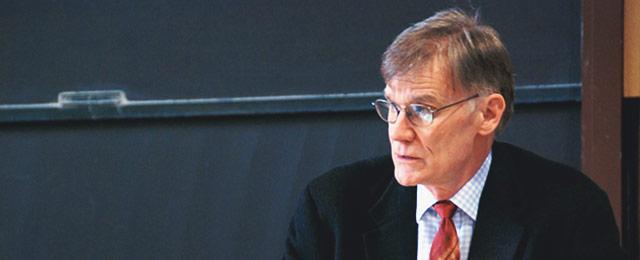This course explores the causes, course, and consequences of the American Civil War, from the 1840s to 1877. The primary goal of the course is to understand the multiple meanings of a transforming event in American history. Those meanings may be defined in many ways: national, sectional, racial, constitutional, individual, social, intellectual, or moral. Four broad themes are closely examined: the crisis of union and disunion in an expanding republic; slavery, race, and emancipation as national problem, personal experience, and social process; the experience of modern, total war for individuals and society; and the political and social challenges of Reconstruction.

This Yale College course, taught on campus twice per week for 50 minutes, was recorded for Open Yale Courses in Spring 2008.
Syllabus
This course explores the causes, course, and consequences of the American Civil War, from the 1840s to 1877. The primary goal of the course is to understand the multiple meanings of a transforming event in American history. Those meanings may be defined in many ways: national, sectional, racial, constitutional, individual, social, intellectual, or moral. Four broad themes are closely examined: the crisis of union and disunion in an expanding republic; slavery, race, and emancipation as national problem, personal experience, and social process; the experience of modern, total war for individuals and society; and the political and social challenges of Reconstruction.
Bruce Levine, Half Slave and Half Free: The Roots of the Civil War. Hill and Wang.
David Blight, Why the Civil War Came. New York: Oxford University.
Charles R. Dew, Apostles of Disunion: Southern Secession Commissioners and the Causes of the Civil War. University of Virginia Press.
Drew G. Faust, Mothers of Invention: Women of the Slaveholding South in the American Civil War. University of North Carolina Press.
E. L. Doctorow, The March. Random House.
Eric Foner, A Short History of Reconstruction, 1863-1877. Harper & Row.
Frederick Douglass, Narrative of the Life of Frederick Douglass, An American Slave, ed. by David W. Blight. Bedford Books.
Gary Gallagher, The Confederate War: How Popular Will, Nationalism, and Military Strategy Could Not Stave Off Defeat.Harvard University Press.
James M. McPherson, Battle Cry of Freedom. Oxford University Press.
Louisa May Alcott, Hospital Sketches, ed. by Alice Fahs. Bedford Books.
Michael P. Johnson, ed., Abraham Lincoln, Slavery, and the Civil War. Bedford Books.
Nicholas Lemann, Redemption: The Last Battle of the Civil War. Farrar Strauss Giroux.
William Gienapp, ed., Civil War and Reconstruction: A Documentary Collection. Norton.
We are using two anthologies of documents (Gienapp and Johnson). Teaching Assistants will have discretion in assigning particular documents for each week's sections, and many such documents will be especially important for use in paper assignments. James McPherson's Battle Cry of Freedom: The Civil War Era is provided largely as background reading. For further background reading on the post-war period you may want to consult David W. Blight, Race and Reunion: The Civil War In American Memory.
Films:
Films will be scheduled during the course: especially several episodes of the PBS series, "The Civil War." The film, "Reconstruction: America's Unfinished Civil War," will also be assigned. Selections of Civil War era poetry may also be provided at times during the course.
There will be two required papers of 5-6 pages each. Choices of topics and readings will be provided in each of two broad categories or sections of the course: 1) antebellum society and Civil War causation; and, 2) the military, political, and social meanings of the Civil War itself. The challenges, accomplishments, and failures of the Reconstruction era will be a significant part of a scheduled, final examination during finals week.
Paper 1: 30%
Paper 2: 30%
Final exam: 30%
Discussion section attendance and participation: 10%